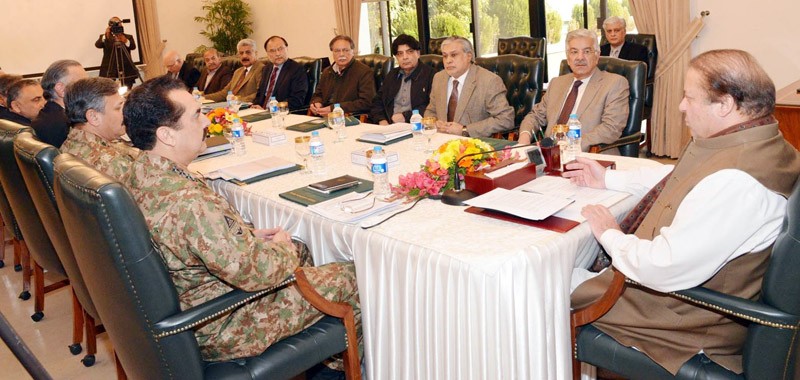
By allowing the military courts to solve the problem of terrorism, the government is following the public pulse, and that pulse is based on a flawed social order

As the dust settles and the military courts emerge as the future of Pakistan’s solution for solving the problem of terrorism, very few have been vocal against these steps taken by a democratically elected government. The constitutional amendment effecting the setting up of these courts has received a consensus vote from both the houses of the parliament.
Post Peshawar massacre, the momentum to eliminate terrorism should have translated into eradicating extremism from society at large and improving the judicial and legal systems. Instead it has given more space to the military, which in the past has been accused of harbouring the very militants whose off-springs today haunt Pakistan.
However, the few outspoken ones speaking against what is being referred to as alternate parallel structure feel that this move by the government has further eroded people’s trust in normal judicial systems and constitutional system of governance.
"The judges feel that judiciary is being castrated in the public mind," says Salman Akram Raja, a renowned constitutional expert and a Supreme Court lawyer.
According to Raja, the formation of military courts will not be ultimately good for any civilian constitutional structure of governance because it makes the constitution a contingent luxury.
"The legal community feels disenchanted already and the state is itself promoting that kind of lack of trust. That’s a long term loss which will be hard to recover," he adds.
The government has assured with its several speeches in and outside the parliament about how only ‘jet black terrorists’ will be tried but the fact is that it has done away with the basic principle of fundamental rights of Pakistanis by taking away their right to appeal. Also, the term jet black terrorist is vague, and comes with the framework of ‘guilty if not proven innocent’.
"Persons sent to a military court will be presumed guilty and we don’t know what will be the standard of evidence that will apply since military officials who are not judicially equipped will be hearing the case," Raja further adds.
Others also feel that the Peshawar incident that left 142 people, most of them children, dead is being used as an excuse by the military to take over judicial responsibilities and not be questioned about it, which they have been pushing for some time, especially since the missing person cases started surfacing.
"When Protection of Pakistan Act was being passed, the parliament changed the final draft not as per the wishes of armed forces, and gave the suspects a right to appeal at the high court level. This was an issue that with this new amendment in the Army Act the Army will be able to handle," says Muneeb Farooq, a talk show host on Geo News, Pakistan’s largest television news network.
Farooq feels that the politicians caved in because they had no other choice.
"The Pakistan Army ensured that the politicians knew either they are standing with them or against them, so the political parties in the parliament gave in," he adds.
While the legal fraternity and some observers have been criticising this step, the public at large in Pakistan seems to consider this a step in the right direction. However, this public wide acceptance is a worrying sign. And it appears that the government that is elected to represent the people of Pakistan is following the public pulse, and that pulse analysts feel is based on a flawed social order.
"Pakistani ethos is such. Our mindset is to give street justice -- then and there. The public does not understand what it means to have due process. This is the same commonly prevalent mindset that talks of public lynching of robbers, blasphemers etc," says Zaman Khan, who was himself a victim of military courts during General Zia’s martial law in the eighties, and is a Lahore based representative for the Human Rights Commission of Pakistan (HRCP).
Khan who was sentenced for a year and fined heavily by the military courts then feels that Pakistan is an uncivilised society and therefore such decisions receive so much popularity.
"Due to repeated military takeovers the importance and understanding of rule of law is missing in Pakistan which is the basis of civilised thought process," he adds.
The HRCP has condemned the formation of military courts and has expressed fears that it may be used for political victimisation, especially against the nationalists.
"The military is said to be behind the mysterious killings of Baloch and Sindhi nationalists. With this law, they will even have the formality of so-called judicial process and therefore a legal cover to do as they please," explains Khan, the HRCP rep, adding that there is a strong possibility that it may also be used against other political parties, as witnessed in the past.
Many PML-N and PPP prominent political figures have been tried under the military courts previously and were punished, especially in Zia-ul-Haq’s time and then in current Prime Minister Nawaz Sharif’s own previous tenure. He himself also became a victim when the special anti-terrorist courts he had formed in the 1990s convicted him of terrorism charges.